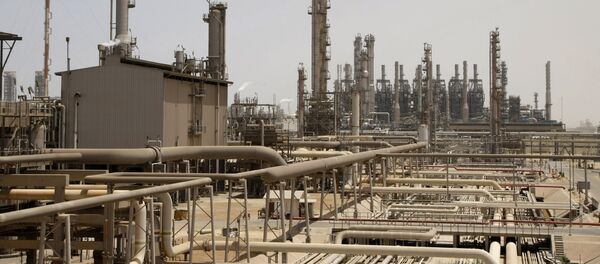Kristian Rouz — As global oil prices fluctuate between gains and losses just below the $50/bbl sweet spot, investors have turned their attention to stocks of large energy enterprises, seen as more profitable in the longer run. Market observations suggest oil prices are poised for greater volatility throughout this year, potentially rolling back to as low as $40/bbl, and rebounding their current value in a largely unpredictable manner.
According to estimates by the UBS Group AG, a Swiss-based multinational bank, investing in "big oil" stocks is at this point a more lucrative strategy than trading crude given the current uncertainty in energy prices. With impact of small-cap drillers to the market and prices are waning, severe disruptions in supply from notable oil producers among developing nations, gains in oil output in Russia and Saudi Arabia, and the global economy slowing down as a combination of upward and downward factors to oil prices, the wisest choice would be exiting crude trading. While it would take time to show what factors will eventually prevail, "big oil" has traditionally turned out to be winners no matter the scale of short-term volatility in energy prices.
"Big oil is what I own now because they're less sensitive to movement in price and they're going to pay me a dividend," said Wayne Gordon of UBS.
Global oil market is unbalanced at this point: while rising production in Russia, Saudi Arabia and Iran has depressed prices in Asia and, to a lesser extent, in Europe, rising demand in the US has pushed prices up. On Wall Street, many short oil positions are subject to cuts, with investors seeking longer-term gains, while short-term crude trading is only benefitting when prices fall.
"Investor positioning points to further support for commodity prices as bearish bets continue to be reduced," ANZ bank said in a statement on Tuesday.
Subsequently, US and international oil prices almost reached parity on Tuesday, with WTI rising to $49.50/bbl, and Brent crude sliding to $49.65/bbl.
Oil prices sank to their 12-year lowest in February, having rebounded by almost 80% ever since. However, the supply-demand balance in the market is very fragile ahead of the planned OPEC meeting, set for Thursday in Vienna. Should the world's once-powerful oil exporters fail to negotiate a common ground on extraction quotas and pricing policy, the value of oil is poised to plunge.
"We don't think this meeting is going to come to too much," UBS' Gordon said. "The key here is whether the undrilled wells in the U.S., given the increase in price, start to be explored and start to produce."
In the longer-term, however, upward trends in oil prices are seen as prevailing moderately. On the other hand, "big oil" companies' resilience to shocks has also proven impressive and convincing enough for the energy shares to meet investors' demand again, no matter the prices.





